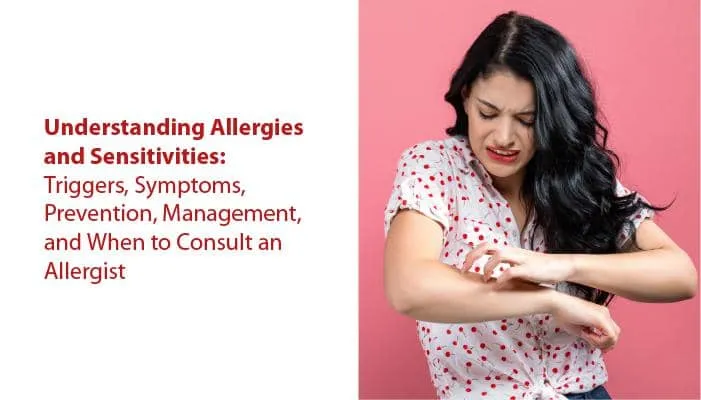Understanding Allergies and Sensitivities: Triggers, Symptoms, Prevention, Management, and When to Consult an Allergist
September 22, 2023
Introduction:
- Introduce allergies and sensitivities as common immune system reactions to certain triggers.
- Mention that the blog will explore what allergies and sensitivities are, common triggers, symptoms, preventive measures, available management options, and when to seek guidance from an allergist.
Understanding Allergies and Sensitivities:
- What Are Allergies and Sensitivities? Define allergies as immune responses to harmless substances (allergens) and sensitivities as non-immune reactions to specific triggers.
- Common Allergens and Triggers: Introduce common allergens like pollen, dust mites, pet dander, and common sensitivities like food intolerances.
Common Triggers:
- Discuss common triggers for allergies and sensitivities, including:
- Environmental Allergens: Such as pollen, mold, and dust.
- Food Allergens: Like nuts, dairy, shellfish, and gluten.
- Insect Stings and Bites: Such as bee stings.
- Medications: Mention drug allergies.
- Skin Sensitivities: Like contact dermatitis caused by certain substances.
Symptoms:
- Describe typical symptoms of allergies and sensitivities, which can range from mild to severe and may include itching, sneezing, hives, digestive issues, breathing difficulties, and anaphylaxis in severe cases.
Prevention:
- Allergen Avoidance: Emphasize the importance of identifying and avoiding allergens or triggers.
- Food Label Reading: Encourage reading food labels for potential allergens.
- Air Purifiers: Suggest using air purifiers to reduce indoor allergen exposure.
- Insect Avoidance: Discuss measures to avoid insect stings and bites.
- Skin Protection: Advise against contact with known skin irritants.
Management:
- Medications: Describe over-the-counter and prescription medications, including antihistamines, decongestants, and epinephrine auto-injectors for severe allergic reactions.
- Immunotherapy: Explain how allergen immunotherapy (allergy shots) can help desensitize individuals to specific allergens.
- Dietary Changes: Discuss dietary modifications for food allergies and intolerances.
- Avoidance Strategies: Mention strategies for managing environmental allergies, like using allergen-proof bedding and regular cleaning.
When to Seek Medical Advice:
- Highlight the importance of consulting an allergist or healthcare professional if experiencing severe symptoms, having a known allergy or sensitivity, or requiring specific tests for diagnosis.
- Mention that professional guidance can help determine the most appropriate management approach.
Conclusion:
- Summarize key takeaways, including the importance of allergen avoidance, proper management, and seeking professional advice when dealing with allergies and sensitivities.
- Encourage readers to prioritize their health and consult allergists or healthcare professionals for personalized guidance.
Can allergies develop later in life?
Yes, allergies can develop at any age, although they often manifest in childhood.
How are allergies diagnosed?
Allergies can be diagnosed through allergy tests, including skin tests or blood tests to identify specific allergens.
NOTICE BOARD
CONTACT US
CONTACT US
 Book Appointment
Book Appointment


.svg)
.svg)
.svg)
.svg)








